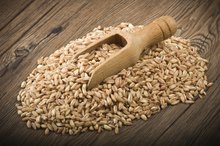Wheat Chex Cereal Nutrition Information
A healthy breakfast can improve your energy levels and help you control your weight. Wheat Chex cereal from General Mills is a whole-grain, low-fat, ready-to-eat breakfast cereal that can help you prepare breakfast quickly. Eat it with milk and some fruit for a balanced breakfast. You can also have it as a dry snack.
Calorie Count
Each 3/4-cup serving of Wheat Chex, or 47 grams or 1.7 ounces, contains 160 calories. It provides 1 gram of fat, or 10 calories from fat, and has no saturated fat. The cereal has 5 grams of protein, or 20 calories from protein, and 39 grams of carbohydrates, or 112 calories from carbs. Low-fat, low-calorie foods can help you limit the calories in your diet if you are trying to lose weight or prevent weight gain.
Dietary Fiber
The Health Benefits of Kasha
Learn More
A 3/4-cup serving of Chex Mix provides 6 grams of dietary fiber. Healthy adults should get at least 14 grams of fiber per 1,000 calories in the diet, but the average American gets about half that amount, according to the U.S. Department of Health and Human Services and U.S. Department of Agriculture. The Linus Pauling Institute explains that dietary fiber may help prevent constipation and lower your risk for type-2 diabetes and cardiovascular disease. Whole-grain products, such as Chex Mix, are higher in fiber than refined grains.
Vitamin Content
Wheat Chex is fortified with essential vitamins and minerals. A 47-gram serving provides 100 percent of the daily value for folic acid, which helps pregnant women protect their babies from neural tube birth defects. Each serving of Wheat Chex provides 10 percent of the daily value for the antioxidant vitamins A and C and also for vitamin D, which helps your body absorb and use calcium. Eating your cereal with fruit, milk and nuts increases the vitamin content of your breakfast.
Calcium and Iron
Good Carbs to Eat for Breakfast
Learn More
A 3/4-cup serving of cereal has 10 percent of the daily value for calcium, which is an essential mineral for building and maintaining strong bones. Adding a half-cup of fat-free milk to your cereal provides an additional 15 percent of the daily value for calcium. The cereal has 80 percent of the daily value for iron in each serving. Iron is a part of healthy red blood cells, and a deficiency can lead to iron-deficiency anemia.
Related Articles
References
Writer Bio
Natalie Stein specializes in weight loss and sports nutrition. She is based in Los Angeles and is an assistant professor with the Program for Public Health at Michigan State University. Stein holds a master of science degree in nutrition and a master of public health degree from Michigan State University.









